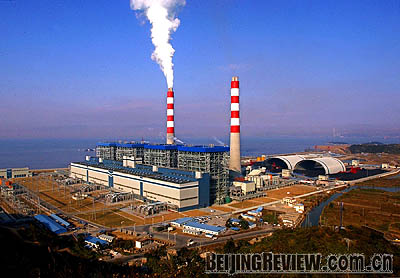|

LOSING STEAM: China Huaneng Group, one of China's five largest state-owned power plants, has suffered losses because of high coal prices
If electricity prices were not raised together with fuel prices, the country's power plants could not survive. This is the common voice of China's power plants now.
At a working conference of the State Electricity Regulatory Commission (SERC) on May 6, China's five largest power plants all said that their operations have been difficult under current electricity price levels.
Liu Bo, Deputy Director of the Operations Department at China Huaneng Group, said 60 percent of the company's coal-burning generating sets with a production capacity of 300,000 kilowatts or more were losing money. Meanwhile, losses at China Datang Corp. (CDC), China Power Investment Corp., China Huadian Corp. (CHC) and China Guodian Corp. (CGC) ranged from 400 million yuan ($57.72 million) to 900 million yuan ($129.87 million) in the first quarter of the year.
"It is the first time in the past five years for CDC to see losses," said Fang Xiao, Director of the Marketing Department of CDC.
"The more electricity we generate, the more money we lose," said Wang Xinan, Deputy Director of CHC. In the first quarter, CHC's power generation amount had risen almost 25 percent from a year ago, but its losses reached 813 million yuan ($117.32 million).
Zhang Yao, Dean of the Electric Power College of South China University of Technology, told the Information Times on April 25 that he believes first-quarter losses occurred not only in the five largest power plants, but also throughout the whole industry.
Data from the China Electricity Council indicate that in the first two months of 2008, profits at thermal power plants decreased 75.39 percent. Among the 4,773 power plants whose annual sales revenues are more than 5 million yuan ($714,000), 41.69 percent, or 1,990 power plants, were suffering losses.
Liu Zhenqiu, Deputy Director of the Department of Price of the National Development and Reform Commission (NDRC), told the Economic Information Daily that China's power plants eat up about 50 percent of the country's coal. But in recent years, coal prices on the domestic market have climbed about 10 percent on average every year.
SERC data show the average coal prices for power generation rose to 304 yuan ($43.87) per ton in 2007 from 281 yuan ($40.49) per ton in 2006, so that fuel costs for power plants increased an overall 29.4 billion yuan ($4.24 billion) in 2007.
The government last raised electricity prices on June 30, 2006-the second price hike occurred as a result of an increase in the price of coal.
Figures from Shanxi's coal market, the largest coal production province of China, indicate that coal prices will be raised again by 50-70 yuan ($7.22-10.10) per ton.
"Many power plants are appealing to raise electricity prices, but we should also note that the consumer price index still rises very fast this year, and raising electricity prices will bring large obstacles for us to accomplish the price regulation target this year," said Xu Zhimin, Inspector of the Bureau of Economic Operations of the NDRC.
This means that the third round of linked price increases for coal and electricity will continue to be postponed.
Zhang Qi, a coal industry analyst at Orient Securities Co. Ltd., said there are two major reasons for the recent coal price hikes. On the one hand, because the state is improving coalmine safety production, many unsafe mines have been closed, and the production capacity of coalmines in the countryside has been restrained. On the other hand, earthquake-devastated Sichuan Province has stopped production activities in its coalmines, adding to the country's existing shortage of coal.
Figures from Ping An Securities Co. Ltd. indicate there is a shortage of 40 million tons of coal on the domestic market. With the approach of the summer electricity consumption peak and the necessity of securing power supplies during the Olympic Games, the NDRC is requiring power plants to maintain coal inventories at levels that can meet power generation demand for at least 15 days instead of seven. Coal demand from power plants will then increase.
Zhao Xinyan, CGC's Vice President, said, as required by the government, large state-owned power plants will continue to supply electricity even with slim profits. But under the pressure of high coal prices, small power plants may have no cash to buy coal to generate electricity.
To solve the ongoing problem of not having enough coal to generate electricity, the NDRC is considering a new way to secure coal supplies, Xu said. It first will supervise the performance of key contracts on power coal signed between coalmines and large power plants, since coal prices for these contracts are lower than the market price. At the same time, the NDRC also hopes that coal enterprises can properly control the price hikes; otherwise, it might put into place new regulations.
Zhu Baoliang, Deputy Director of the Department of Economic Forecast of the State Information Center, said the government also is considering another possible solution. It is looking at increasing the price of electricity purchased by power grids while maintaining existing prices for consumers. At the same time it would provide subsidies to the grids, he said, according to a Xinhua News Agency report. But providing subsidies would be a last resort, because it would not be in keeping with a market economy, he said. | 